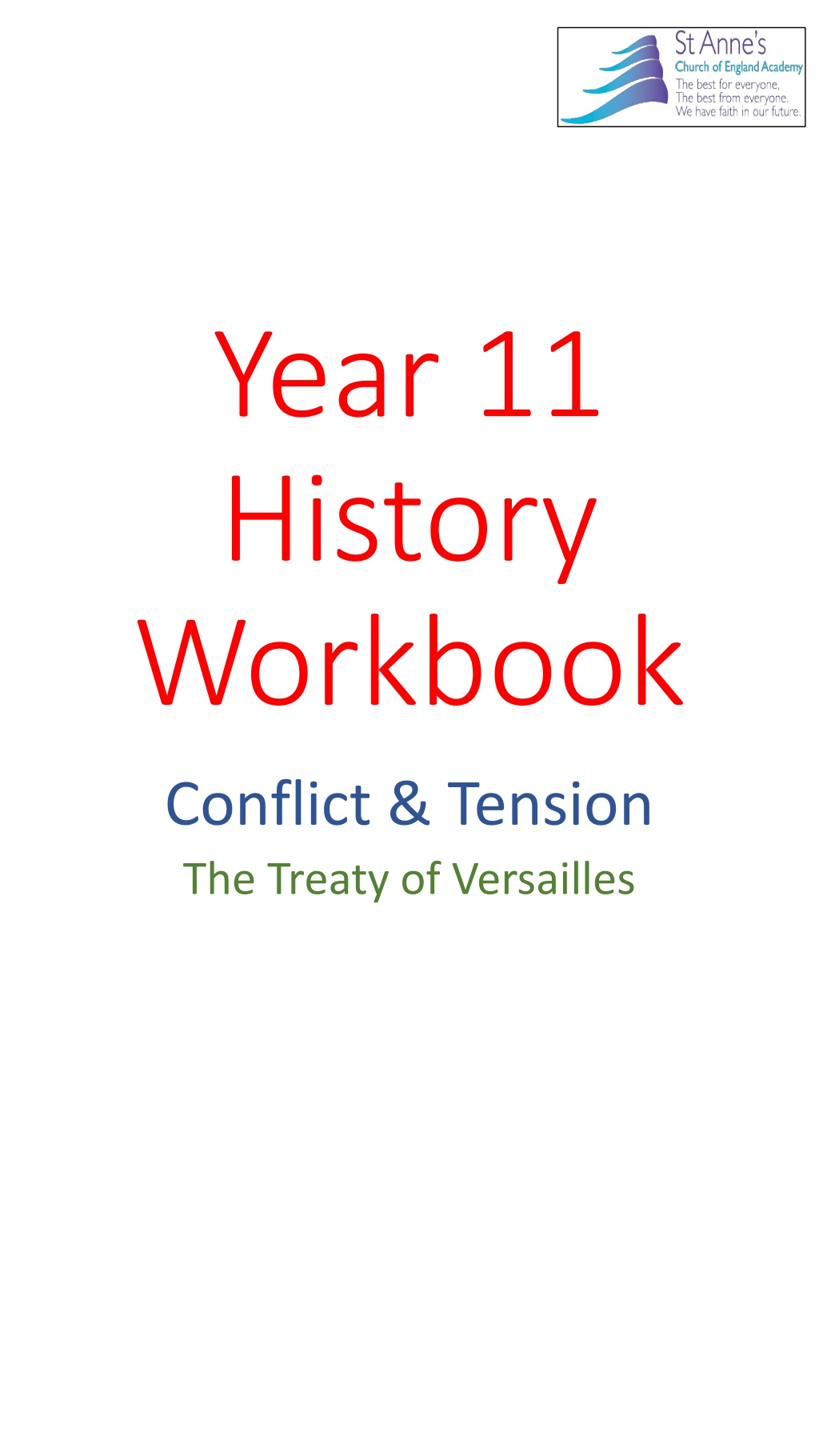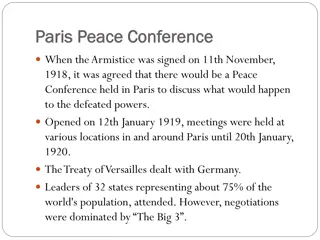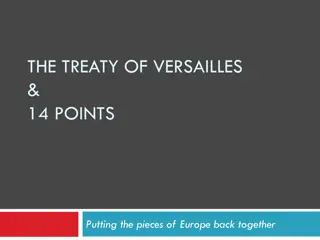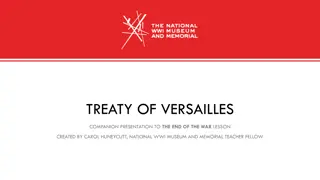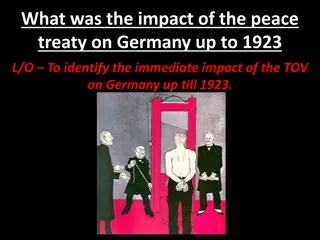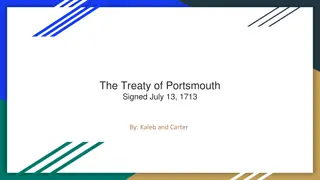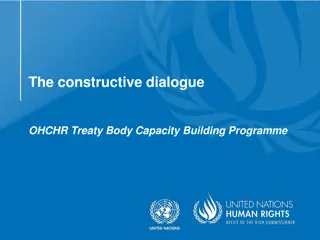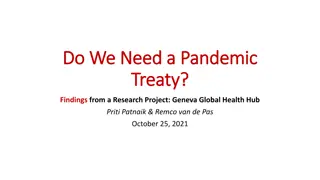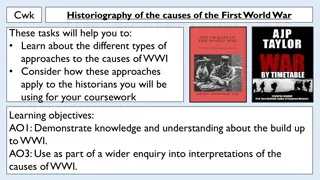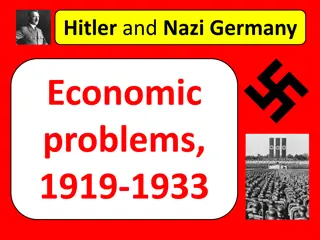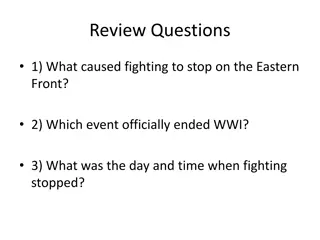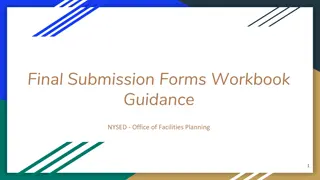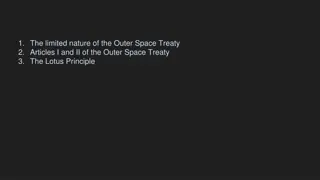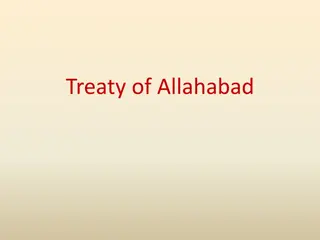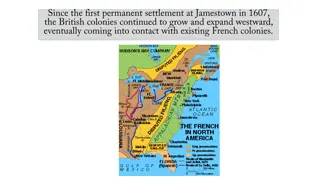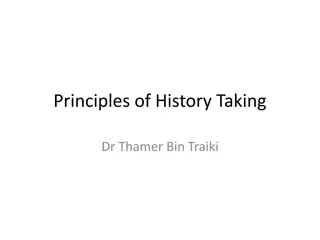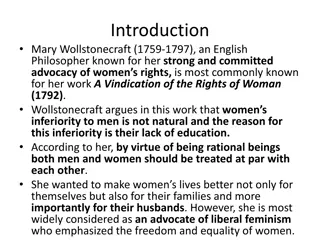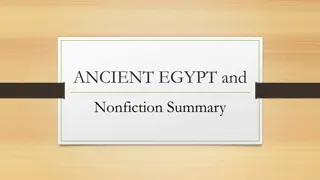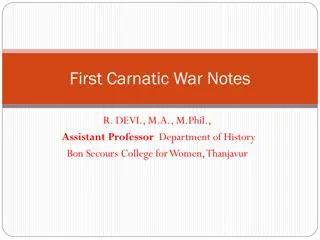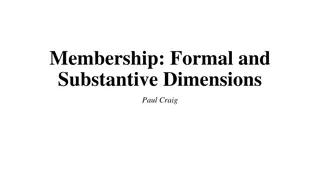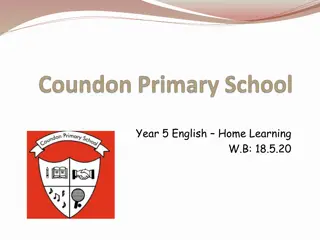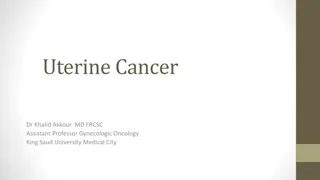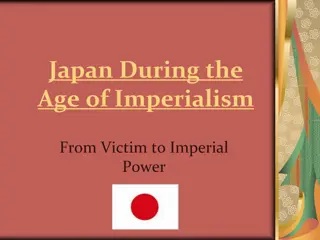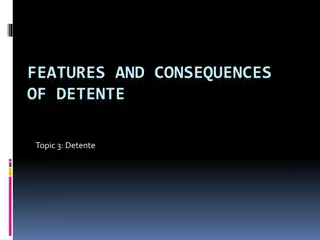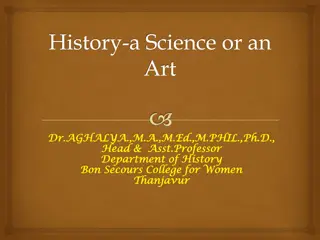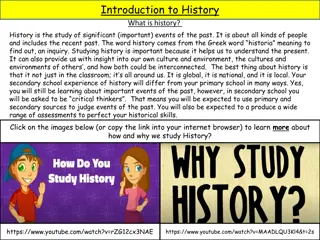Understanding the Treaty of Versailles in Year 11 History Workbook
Exploring the aftermath of World War I, this Year 11 History workbook delves into the Treaty of Versailles, focusing on the aims of the Big Three leaders, the challenges they faced, and the terms imposed on Germany. Students engage in analyzing key points and disagreements, providing a comprehensive understanding of this significant historical event.
Download Presentation

Please find below an Image/Link to download the presentation.
The content on the website is provided AS IS for your information and personal use only. It may not be sold, licensed, or shared on other websites without obtaining consent from the author. Download presentation by click this link. If you encounter any issues during the download, it is possible that the publisher has removed the file from their server.
E N D
Presentation Transcript
Year 11 History Workbook Conflict & Tension The Treaty of Versailles
Lesson 1: The Aims of the Big Three Who were the Big Three? Georges Clemenceau, Prime Minister of France David Lloyd-George, Prime Minister of Britain Woodrow Wilson, President of the USA The Fourteen Points Wilson had a list of ideas about how to make a better world. They were known as the Fourteen Points. They included: No secret treaties Ships of all nations have the right to sail the seas without interference Disarmament Self-determination in the Austria-Hungarian empire The League of Nations to be formed Task 1) Which of these points do you think was going to make the biggest difference? Write a list of the reasons why they Big Three disagreed. 2)
What were the other problems? The disagreements between the leaders was only one problem. Task As you read the information below, make a mind map of the other problems the Big Three faced. Problem: The Armistice When Germany surrendered, it signed an armistice, an agreement to stop fighting immediately. The armistice included agreement that Germany would pay reparations and that Alsace- Lorraine would be given back to France and they would take their army out of the Rhineland. Clemenceau used this agreement to argue that they should be included in the peace treaty. Problem: Prior Agreements During the war, the Allies had made lots of promises to countries who supported them. At the end of the war these countries wanted to claim what they saw as rightfully theirs. The Big Three had to decide which promises should be kept. Time Constraints The Big Three met in Versailles in January 1919. The Treaty of Versailles was signed in June. There were diplomats from 32 countries and each point was discussed in great detail. But they were under pressure to decide quickly by the victorious countries. Problem: A Changing Europe The politics and economies of European countries had changed during the war. Austria-Hungary had a huge empire but now countries were breaking away and declaring independence. There was a revolution in Russia in 1917. People were worried that the poverty in Europe caused by the war and the political instability would cause more trouble in the future. Task 1) What did Germany agree to in the armistice? 2) Why did the Big Three have to agree as quickly as possible? 3) In 1919 Wilson was awarded the Nobel Peace Prize for his role in the Paris Peace Conference. Do you think he deserved this prize?
Lesson 2: The Treaty of Versailles Diktat On 28th June 1919 the Treaty of Versailles was announced. Germany had not been allowed to attend the peace talks. They called the treaty a Diktat. Diktat dictated peace, the phrase Germany used to describe the Treaty of Versailles Build up to the Signing When the discussions were over, the German government was told what the terms were. The Treaty aimed to punish Germany, prevent them from attacking France again and give the winning countries compensation to help them rebuild. Germany was told the Allies would start the war again if they refused to agree to the terms. The Terms The easiest way to remember the terms of the Treaty is to use LAMP to help you: Land Army Money Pride Task 1) 2) 3) Use the cards below to complete the table on the next page. Why do you think the Germans hated Article 231 the most? Why do you think Article 232 came after the war guilt clause? The Germans navy was limited to 15,000 men, 1500 officers and 6 battleships. The size and number of other ships was also limited. Article 231 was the war guilt clause. Germany and their allies had to take full responsibility for starting the war. This was the term the Germans hated the most. The Rhineland, a strip of land between Germany and France, was to be demilitarised. This meant Germany could not put an army or defences in this area. Article 232 ordered Germany to pay reparations. In 2921 the figure was agreed at 6.6 billion. It was estimated to take until 1988 to pay back. Anschluss (union) between Germany and Austria was forbidden. The League of Nations was formed, but Germany was not allowed to join. Germany was not allowed tanks, submarines or an air force. Germany was split in two by the Polish Corridor, a strip of land that was given to Poland to allow them to have access to the sea. The German army was limited to 100,000 men and conscription was not allowed. Danzig was taken from Germany and made a free city under League of Nations control. Germany s colonies in Africa were given as mandates to the League of Nations. This meant Britain and France controlled them. The Saar, an industrial area of Germany with many coal mines, was put in control of the League of Nations for 15 years. Germany lost 10% of its land, including Alsace-Lorraine.
The Treaty of Versailles Land Army Money Pride Exam Practice Territorial losses were the worst punishment faced by Germany in the Treaty of Versailles. How far do you agree with this statement? (16 marks + 4 SPaG) How to Answer 1) Plan your answer so there is a strong structure. 2) Aim to have three factors (or at least one on each side of the argument). 3) Use PEA make sure you link the paragraph directly to the statement. This is an example of the first paragraph: It could be argued that territorial losses were the worst punishment faced by Germany because they lost 10% of their land. Germany was split in two to create the Polish corridor, cutting off one part of Germany from the rest. In addition this this, they were forced to give Alsace-Lorraine back to France and lost their colonies in Africa. The Treaty also demanded that the Rhineland was demilitarised and the Saar, an important industrial area, was taken from German control. This was deeply humiliating to the Germans because it attacked their sense of pride. Therefore, the territorial losses were a serious punishment because it had a huge economic affect on Germany.
Lesson 3: Were the Allies Satisfied? Britain During the war, there had been a lot of anti-German propaganda in Britain so there was little sympathy for Germany after the war. Nearly every family had lost someone and there had been food shortages and civilian restrictions. When the Treaty was signed, there was a general feeling that it was fair but could have been harsher. But Lloyd George was treated as a hero when he arrived home and the newspapers claimed that Britain would never be threatened again. But was Lloyd George happy with it? Partly. The British Empire had gained colonies. The German navy was restricted so Britain could rule the seas without competition. But Lloyd George was worried that the loss of German land and people to Poland would cause huge problems in the future, especially if those people were determined to be part of Germany again. He also felt the reparations were too harsh. Britain would lose an important trade partner and the Germans would resent the Treaty so much it could lead to another war.
France France has suffered badly and wanted Germany to pay. There were parts of the Treaty that they were happy with. They were pleased that Germany could no longer threaten them through the Rhineland and that Germany would pay them reparations. They were also pleased they were given control of the Saar region. But many thought the Treaty should have been much harsher. Clemenceau was angry that Germany was allowed an army and thought the Rhineland should have been taken away. France should have been given the Saar permanently and the reparations weren t high enough. Clemenceau lost the election soon after the Treaty. The French people didn t believe he had got them the Treaty they wanted. The USA America joined the war in 1917 and had not suffered any damage. Many Americans thought the Treaty was too harsh and that Wilson had helped Britain and France become more powerful at Germany s expense. The USA favoured isolationism. They didn t think the USA should be involved in European affairs. They wanted a Treaty which guaranteed peace in the future, but felt that they had got the opposite. The Senate refused to support the Treaty. This meant that the USA couldn t join the League of Nations. Wilson was devastated. He feared another war would happen. He toured the USA, campaigning for the USA to join the League. But his efforts exhausted him and he died from a stroke in 1924. The Republicans were in control for the next decade and focused on isolationism. Isolationism a policy in which a country does not get involved in foreign affairs Task Use the information you have just read on Britain, France and the USA to fill in the table on the next page. For each country: Give a score of 1 to 5 1 means very dissatisfied, 5 means very satisfied. Explain why you gave this score underneath.
How satisfied were the Allies with the Treaty of Versailles? BRITAIN FRANCE THE USA 1 2 3 4 5 1 2 3 4 5 1 2 3 4 5 Exam Practice Source A supports Wilson s view of the Treaty of Versailles. How do you know? (4 marks) How to Answer Describe what the cartoon shows and use your knowledge to explain why it shows this. Source A: An American cartoon called Seein things , published in the Brooklyn Eagle, 1919 Use this model answer to help you improve your answer to this exam question: Source A supports Wilson s view of the Treaty of Versailles because it shows a Senator hiding in his bed mistaking a peaceful dove for a vulture. The dove represents the League of Nations and the Senator is shouting for it to be taken away. Wilson argued that the USA needed to join the League of Nations to protect the USA and the world from future conflict. However, the Senate preferred a policy of isolationism so they refused to allow the USA to join the League. This cartoon shows that isolationism by referring to the dove as a vulture, suggesting that the Senate believed the League would prey on the USA and cause damage.
Lesson 4: German Reaction to the Treaty The German people had suffered during the war and had hoped for compassion to help them rebuild. The Kaiser had abdicated so they felt that the person to blame for the war had been punished already. They were shocked by the severity of the Treaty. Germany had not even been allowed to negotiate and they felt the Diktat was unfair and unjustified. Many wanted to reject it but knew the only alternative was more war. The population hated the government for signing the Treaty. They said the government had stabbed Germany in the back. Task Why were the German people shocked at the terms in the Treaty of Versailles? Politics in Germany When the Kaiser abdicated, the Weimar Republic was set up. But a lot of people didn t think it would be strong enough to run the country. Many revolts broke out and the first five years after the war were unstable and violent. Task Why were there protests all over Germany? Hatred for the Treaty The Germans hated Article 231 the most, the war guilt clause. Germany had to accept responsibility for starting the war and pay reparations. The economy was ruined. The government claimed that 763,000 civilians had died of starvation. Giving up the Saar resulted in losing 16% of their coal and 48% of their steel. They also lost land. Nearly 6 million German nationals now found themselves living in different countries, often under governments who resented Germany. Germany was also humiliated by the restrictions to the army. They felt vulnerable and alone, surrounded by hostile countries. Many thought France could attack at any point. The new communist government in Russia may also be a threat from the east. Task Why did the Germans hate the Treaty of Versailles?
Exam Practice Write an account of how the Treaty of Versailles caused problems for Germany. (8 marks) How to Answer 1) Plan your answer. 2) Try to have three or four events. 3) Show how one event led to the next start each new paragraph by explaining how it links to the previous paragraph. Plan What events can be included in this answer? Germans blamed the government Weak new Weimar Republic Damage to economy Fear of attack
Lesson 5: Was the Treaty Unfair? The theme so far has been that the Treaty was resented and unfair so we ll start by looking at why exactly this was. Task What is the main reason the Treaty of Versailles was unfair? Explain your answer. Can it be defended? Some historians argue it can. The Treaty was signed at the end of the most devastating war the world has ever seen. It was right that the losing countries should pay. It was normal for the losers to agree to harsh peace terms. If Germany had won they would have done the same to the Allies. Europe was falling apart. The collapse of empires made Europe unstable. The peacemakers had to act quickly and they did the best they could under pressure. Task Can the Treaty of Versailles be defended?
The New States At the end of the war lots of new countries were made. Some of these worked well. Czechoslovakia was a rich country and did well. It was politically stable and well respected. But there were problems in other countries The Allies wanted to create a buffer zone between Germany and the USSR. They created Poland, but this new country had no natural barriers like mountains and was difficult to defend. Poland was given the Polish Corridor. It aimed to weaken Germany by spitting it, whilst also giving Poland access to the sea. But it meant lots of Germans then lived in Poland, which they hated. The USSR also argued about Poland s eastern borders. Poland was surrounded by enemies who wanted to reclaim its territory. Europe in 1919 Europe in 1914 Task What problems could these changes create? Conclusion Do you think the Treaty of Versailles can be justified? Use all your knowledge from the last few lessons to look at both sides of the argument before reaching a decision.
